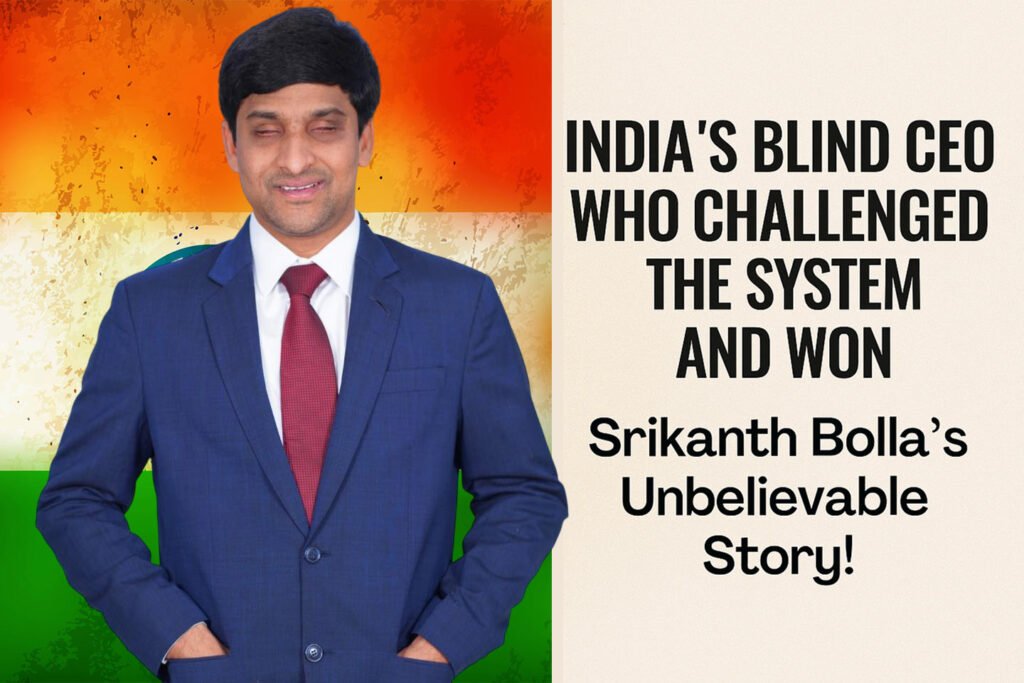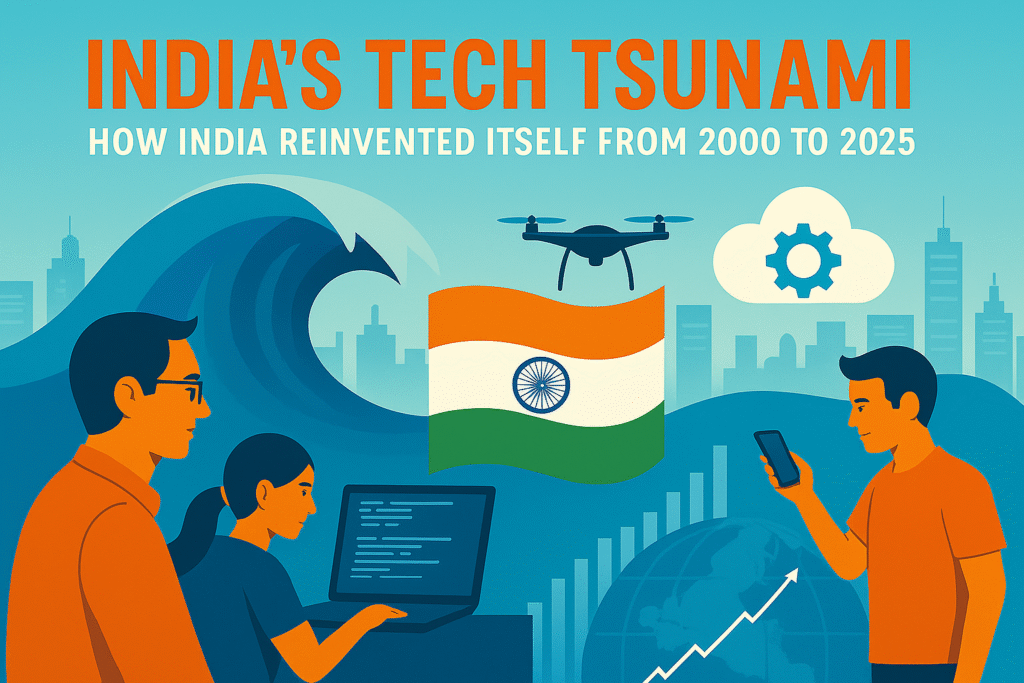
“Are We Destined to Deliver Ice Creams or Innovate Semiconductors?”
This provocative question, posed by Union Commerce Minister Piyush Goyal, has ignited a fervent debate within India’s startup ecosystem. At the recent Startup Mahakumbh in New Delhi, Goyal challenged Indian entrepreneurs to shift their focus from consumer services like food delivery to high-tech sectors such as semiconductors, electric vehicles (EVs), and artificial intelligence (AI). His remarks have drawn both support and sharp criticism, highlighting the complex interplay between government policies and the entrepreneurial landscape in India.BizNews India+7India TV News+7BizNews India+7Reuters+8The Economic Times+8The Times of India+8
Piyush Goyal’s Critique: A Call for Deep-Tech Innovation
During his address, Goyal expressed concern over the current trajectory of Indian startups, emphasizing a perceived overemphasis on quick commerce and consumer services. He contrasted this with China’s advancements in deep-tech domains:ReutersBizNews India+8The Economic Times+8BizNews India+8
“We are focused on food delivery apps, turning unemployed youth into cheap labour so the rich can get their meals without moving out of their house. And what does a Chinese startup do? They work on developing electric mobility battery technologies and they are today dominating the electric mobility ecosystem.” BizNews India+4The Economic Times+4The Economic Times+4
Goyal questioned whether India’s entrepreneurial spirit should be confined to creating delivery services and gourmet products:
“Do we have to make ice cream or chips? Dukandari hi karni hai?” The Economic Times+5BizNews India+5India Today+5
He urged startups to aspire for global prominence by investing in sectors that drive substantial economic value and technological advancement.BizNews India+1The Times of India+1
Startup Founders Respond: Defending the Ecosystem
Goyal’s remarks elicited strong reactions from prominent figures in the Indian startup community. Aadit Palicha, co-founder and CEO of Zepto, defended the contributions of consumer internet startups:India Today+1The Times of India+1www.ndtv.com+9The Economic Times+9Business News Today+9
“It is easy to criticise consumer internet startups in India, especially when you compare them to the deep technical excellence being built in US/China. The reality is this: there are almost 1.5 lakh real people who are earning livelihoods on Zepto today—a company that did not exist 3.5 years ago.” The Times of India+4Business News Today+4India Today+4
Palicha highlighted Zepto’s economic impact, including over ₹1,000 crore in annual tax contributions and significant foreign direct investment (FDI). He emphasized the role of consumer internet companies in laying the groundwork for future technological innovations.Reuters+9The Times of India+9India Today+9Reuters+9Business News Today+9Business News Today+9
Ashneer Grover, former co-founder of BharatPe, acknowledged the importance of aspiring toward deep-tech but criticized the government’s approach:Reuters+6Financial Express+6India Today+6
“China also had food delivery first and then evolved to deep tech. It’s great to aspire for what they’ve done—maybe time for politicians to aspire for 10%+ economic growth rate for 20 years flat before chiding today’s job creators.” The Times of India+3India Today+3Business News Today+3
Mohandas Pai, former CFO of Infosys and chairman of Aarin Capital, questioned the government’s support for deep-tech startups:www.ndtv.com+4The Economic Times+4The Economic Times+4
“Minister @PiyushGoyal should not belittle our startups but ask himself what has he done as our Minister to help deep tech startups grow in India?” www.ndtv.com+2Reuters+2India Today+2
Challenges Faced by Indian Startups: Bureaucracy and Ease of Doing Business
Beyond defending their contributions, startup founders have pointed to systemic challenges that hinder innovation in deep-tech sectors. Anupam Mittal, founder of Shaadi.com, noted:India TodayBusiness News Today+2Financial Express+2India Today+2
“From AI and space-tech to material science, Indian entrepreneurs are ready to take on the world. But capital and the ecosystem for growth and commercialisation are severely lacking. Founders can do most things but not everything.” Financial Express+2Business News Today+2India Today+2
Ganesh Sonawane, founder of Frido, emphasized the need for regulatory reforms:Business News Today
“What we need is the government’s ongoing effort to reduce unnecessary regulations and compliance hurdles. The goal should be to align with the standards of innovative countries.” Business News Today
These sentiments reflect broader concerns about bureaucratic red tape, inconsistent policies, and limited access to capital, which collectively impede the growth of deep-tech startups in India.
Government’s Role: Facilitator or Hindrance?
The debate underscores a critical question: Is the Indian government doing enough to foster an environment conducive to deep-tech innovation? While Goyal’s call for a strategic shift is noteworthy, entrepreneurs argue that without addressing foundational issues such as regulatory complexities, funding constraints, and infrastructure deficiencies, expecting a spontaneous pivot to deep-tech is unrealistic.
For instance, the government’s past imposition of the “angel tax” created apprehension among investors, affecting funding for startups. Although efforts have been made to address such issues, lingering challenges remain.
Conclusion: A Collaborative Path Forward
The discourse initiated by Goyal’s remarks highlights the need for a collaborative approach between the government and the startup ecosystem. While the aspiration to excel in deep-tech is commendable, achieving this goal requires more than just entrepreneurial ambition. It necessitates a supportive policy framework, streamlined regulations, robust infrastructure, and access to capital.
Indian startups have demonstrated remarkable agility and innovation in consumer services, contributing significantly to the economy. Leveraging this foundation to venture into deep-tech domains will require concerted efforts from both policymakers and entrepreneurs. By addressing systemic challenges and fostering an environment that encourages high-tech innovation, India can aspire to be not just a hub for consumer services but also a global leader in technological advancements.
The Government Grip: What’s Really Stifling Indian Innovation?
While Goyal’s criticism aims to steer startups toward higher-value innovation, the entrepreneurs’ counterpoints reveal an inconvenient truth — the Indian state itself may be one of the biggest roadblocks to its own ambitions.
1. India’s Bureaucratic Maze: From Startup India to Start-Stuck India?
In 2016, PM Modi launched the Startup India initiative with lofty goals: ease regulatory burdens, offer tax benefits, and streamline processes. But many founders argue that these promises haven’t translated to reality.
“The bureaucracy has made life so complicated. We spend more time filling forms than building products,” said a Bengaluru-based health-tech founder in an Inc42 survey.
Some of the most common complaints from startups include:
- Lengthy Company Incorporation: Despite digitalization, registering a startup can take weeks — often longer than in the US, Singapore, or even Estonia.
- Angel Tax Ambiguity: Though the government scrapped the contentious tax for DPIIT-recognized startups, many still face notices from the IT department.
- Complicated GST Compliance: Small and medium startups struggle with GST return filings, reverse charges, and inter-state supply regulations — all of which discourage cross-border e-commerce.
- Multiple Nodal Agencies: A fintech startup may need to deal with RBI, SEBI, MCA, and MeitY — all of whom operate in silos.
As one startup founder summed it up:
“It feels like we’re navigating a maze designed by Kafka. Every time we innovate, the government changes the rules.”
2. Where’s the Capital for Deep-Tech?
While Goyal calls for Indian startups to build semiconductors and EVs, deep-tech funding in India remains abysmally low.
According to a 2023 NASSCOM report:
- Only 11% of total startup funding went to deep-tech sectors.
- Semiconductor startups raised less than $50 million in 2022, compared to $4.5 billion in China.
Venture capitalists often avoid these sectors due to:
- High capital intensity
- Long gestation periods
- Unclear exit strategies
- Regulatory ambiguity (especially in space, drones, and defense tech)
Founders in these sectors often find themselves stuck between two extremes: a risk-averse private sector and a slow-moving public sector.
“There’s no DARPA equivalent in India. If the government wants deep-tech, it has to be the first buyer, not just a bystander,” said Debdoot Mukherjee, an AI researcher turned founder.
3. Policy Whiplash: The Cost of Inconsistency
Indian startups frequently suffer from sudden policy reversals and poorly coordinated regulations.
Examples include:
- Cryptocurrency Ban Flip-Flops: RBI first banned, then unbanned, then taxed crypto — driving major exchanges like WazirX to shift operations abroad.
- E-commerce FDI Confusion: Policy changes in 2018 restricted inventory-led models, hurting Flipkart and Amazon, while allowing ambiguities that Chinese-funded players exploited.
- PLI Schemes with Red Tape: While Production-Linked Incentives were launched to attract manufacturers, startups in components, IoT, and AI-enabled systems say the entry barriers are too high.
Result? Startup founders spend more time adapting to policies than building around them.
4. Overregulation Meets Undersupport
Despite grand visions like “Atmanirbhar Bharat” and “Make in India,” the government has often acted more as a regulator than an enabler.
Take India’s Semiconductor Mission:
- In 2021, the government allocated ₹76,000 crore to boost chip manufacturing.
- As of early 2024, not a single fab has broken ground, while Vietnam, Malaysia, and even Saudi Arabia have advanced with global partnerships.
“A chip fab isn’t built on hope and speeches. It needs a clean policy runway, reliable power, water, capital, and most importantly — buyers,” says a senior executive at a US-based chip design firm.
In contrast, China’s State Council funneled over $200 billion into its semiconductor industry with direct subsidies, free land, and guaranteed procurement — enabling the rise of giants like SMIC and YMTC.
5. The Jugaad Paradox: Innovation Despite the System
Despite the chaos, Indian entrepreneurs continue to build — often in spite of the system, not because of it.
Take Ather Energy — India’s leading electric scooter company. Co-founder Tarun Mehta recently revealed how they struggled with government approvals for charging infrastructure, import duties on batteries, and inconsistent FAME-II subsidy claims.
“The system doesn’t reward long-term bets. We’re essentially fighting multiple wars: with incumbents, policy, and public perception,” said Mehta at a TechSparks event.
Even global tech giants aren’t spared. Tesla’s entry into India has been delayed repeatedly due to customs duties, lack of clarity on localization requirements, and bureaucracy.
6. China vs India: Why the Comparison May Be Misguided
Goyal’s comparison with China may inspire urgency — but it also ignores fundamental structural differences.
| Aspect | China | India |
|---|---|---|
| State Capitalism | Centralized, directive investment | Fragmented, with federal-state tensions |
| R&D Investment | 2.4% of GDP (2023) | 0.7% of GDP (2023) |
| Tech Procurement | Gov is first buyer (e.g. AI surveillance) | Limited procurement from startups |
| Ease of Doing Biz | 31st globally (World Bank 2020) | 63rd globally (World Bank 2020) |
| Talent Pipeline | 1.4 million STEM grads annually | 0.8 million STEM grads annually |
India is a democracy — and that’s a strength — but it also means that policy reforms are slower, judicial delays are longer, and consensus is harder to build.
What Needs to Change: A Blueprint for True Innovation
If India genuinely wants to foster semiconductor startups, EV battery breakthroughs, or world-class AI research, here’s what founders and analysts recommend:
🛠️ 1. Simplify Compliance
- Replace dozens of overlapping regulations with a single-window startup clearance system.
- Automate tax filings and reduce frequency for early-stage startups.
💸 2. Fund the Frontier
- Create a sovereign Deep-Tech Fund to co-invest with private VCs.
- Launch state-level innovation missions modeled after Israel’s Yozma or the US’s SBIR.
🏛️ 3. Be the First Buyer
- Government agencies should procure Indian tech products — from drones to language AI to med-tech — rather than relying on imports.
📊 4. Measure Impact Differently
- Move beyond “valuation” and “unicorn count.” Track patents filed, R&D spending, deep-tech employment, and export revenue from IP-led products.
Final Word: It’s Not Ice Cream vs Semiconductors. It’s Infrastructure vs Intent.
Piyush Goyal’s frustration isn’t misplaced. India’s startup dream can’t just be about food delivery and instant gratification. But neither can deep-tech innovation be willed into existence through speeches alone.
The reality is this: India’s entrepreneurs have the talent and ambition. What they lack is a system that matches their urgency, lowers their friction, and backs their boldness.
Because at the end of the day, it’s not about making ice cream or chips — it’s about building a country where founders can build whatever the future demands.


